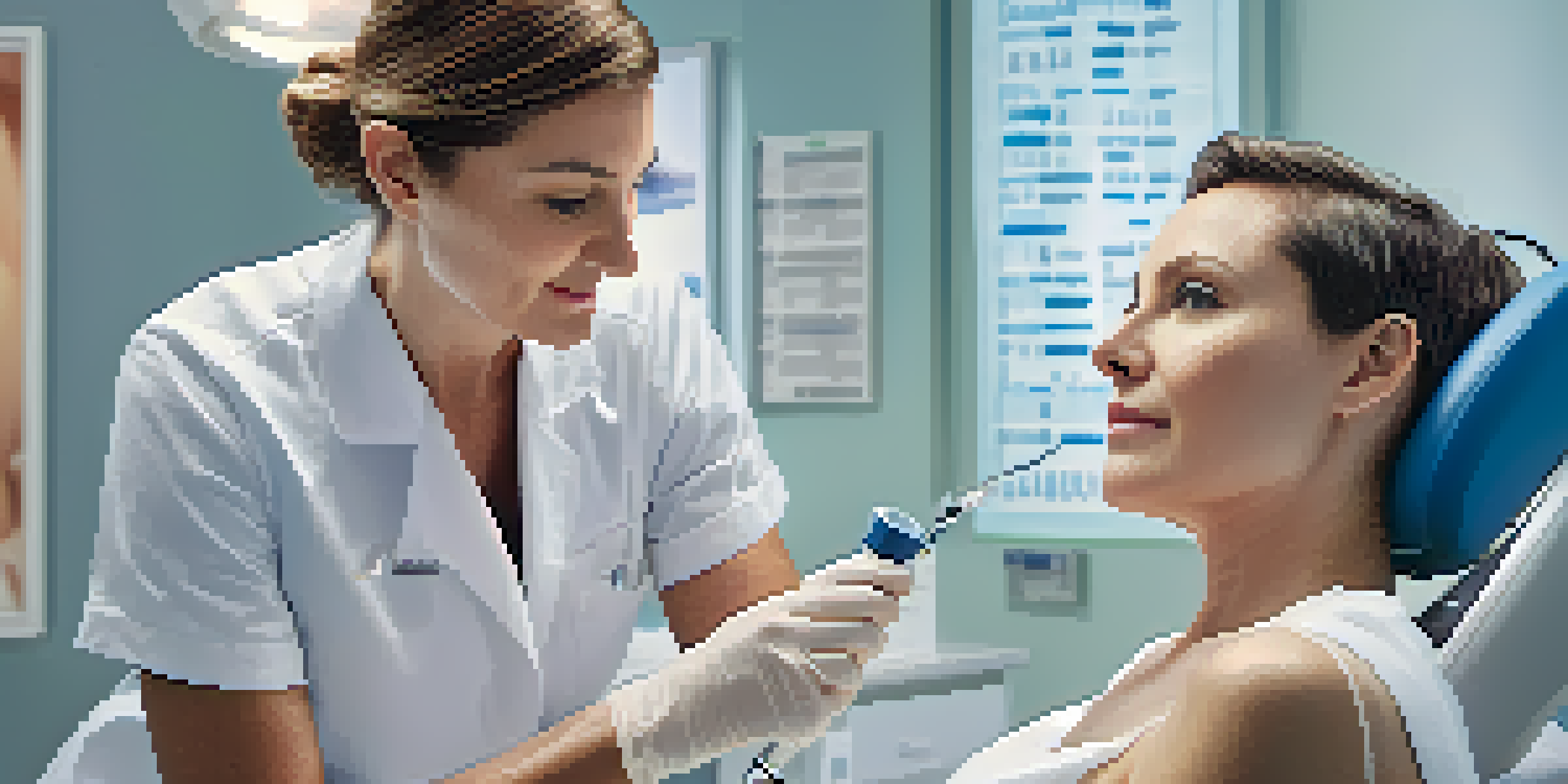The Importance of Skin Cancer Screenings and Early Detection

What is Skin Cancer and Why Should You Care?
Skin cancer, the most common type of cancer in the U.S., arises from the skin's cells. It's crucial to recognize its forms—basal cell carcinoma, squamous cell carcinoma, and melanoma—each varying in severity. Understanding these types helps you appreciate the need for regular skin checks, especially since early detection significantly improves treatment outcomes.
The best way to predict the future is to create it.
With millions of new cases diagnosed annually, the impact of skin cancer is profound. Many people may not realize that unprotected sun exposure, tanning beds, and even genetics can increase your risk. By educating yourself about these risk factors, you empower yourself to take proactive steps in your skin health journey.
Ignoring skin changes can lead to serious consequences, including advanced cancer stages. Just like you wouldn’t skip routine dental check-ups, regular skin screenings should be part of your health routine. Remember, the earlier you catch skin cancer, the better your chances of successful treatment.
The Role of Skin Cancer Screenings
Skin cancer screenings involve professional examinations of your skin by a dermatologist. During these screenings, they look for unusual moles or skin changes that could indicate cancer. This proactive approach allows for the identification of potential issues before they escalate, much like a mechanic catching a car problem early.

These screenings typically include a full-body examination, and it’s highly recommended to have them annually, especially if you're at higher risk. They not only provide peace of mind but also offer an opportunity to discuss any concerns with a medical professional. Think of it as having a regular health check-up, but for your skin.
Know Skin Cancer Types
Understanding the different forms of skin cancer, including basal cell carcinoma, squamous cell carcinoma, and melanoma, is essential for early detection and treatment.
Additionally, dermatologists use tools like dermatoscopes to examine moles closely, giving them a clearer view of any irregularities. This technology enhances their ability to make accurate diagnoses, ensuring that no potential problem goes unnoticed. Regular screenings can truly be a game-changer in the fight against skin cancer.
Recognizing Warning Signs of Skin Cancer
Being vigilant about changes in your skin is essential for early detection. Look for the ABCDEs of moles: Asymmetry, Border irregularity, Color variation, Diameter larger than a pencil eraser, and Evolving changes over time. These characteristics can help you determine whether a mole warrants further examination.
An ounce of prevention is worth a pound of cure.
For instance, if you notice a mole that has changed in size or color, or if it begins to itch or bleed, it’s time to consult a dermatologist. Keeping an eye on your skin is like monitoring your garden; regular checks help you spot problems before they take root. The sooner you act, the better your chances.
Remember, not all skin cancers present the same way, and some may appear as persistent sores or patches. If something seems off, trust your instincts and seek professional advice. When it comes to skin health, being proactive can make all the difference.
The Benefits of Early Detection
Early detection of skin cancer can lead to simpler, less invasive treatments. For example, basal and squamous cell carcinomas are often treatable with localized procedures when caught early. Think of it like catching a small leak in your roof before it becomes a gushing waterfall inside your home.
In contrast, late-stage skin cancer may require more extensive treatments, such as chemotherapy or surgery. The emotional and financial toll can be significant, making early detection not only a health priority but also a practical one. By prioritizing your skin health, you can save yourself from more complicated and costly interventions later.
Regular Screenings Matter
Annual skin cancer screenings by a dermatologist can catch potential issues early, greatly improving treatment outcomes.
Moreover, early detection allows for better survival rates. For instance, the five-year survival rate for localized melanoma is around 99%. By understanding the importance of regular screenings and monitoring your skin, you’re essentially giving yourself the best fighting chance against skin cancer.
How Often Should You Get Screened?
The frequency of skin cancer screenings can depend on various factors, including your age, skin type, and personal or family history of skin cancer. Generally, adults are encouraged to have at least one full-body skin examination each year. If you have a higher risk, such as a history of sunburns or a family history of skin cancer, you might need more frequent visits.
Establishing a routine for skin checks can be as simple as making an appointment during your yearly health check-up. Just like you schedule annual physicals, integrating skin screenings into your routine ensures that you stay on top of your skin health. Consistency is key!
Additionally, you should conduct self-exams monthly, using mirrors to check hard-to-see areas. This practice helps you become more familiar with your skin’s normal appearance, making it easier to spot any changes. Remember, your skin is your body's largest organ, and it deserves regular attention.
Tips for Maintaining Healthy Skin
Maintaining healthy skin is about more than just screenings; it’s also about daily care and protection. Regularly applying sunscreen with an SPF of 30 or higher is crucial, even on cloudy days. Think of sunscreen as your skin's protective armor against harmful UV rays.
In addition to sunscreen, wearing protective clothing and seeking shade during peak sun hours can significantly reduce your risk of developing skin cancer. Staying hydrated and eating a balanced diet rich in antioxidants also supports skin health. Just as you fuel your car with quality gas, your skin thrives on proper nutrition.
Practice Daily Skin Care
Daily habits like applying sunscreen and avoiding tanning beds play a crucial role in reducing the risk of skin cancer.
Lastly, avoid tanning beds and excessive sun exposure, especially during childhood and adolescence. Developing healthy habits early on can set the stage for a lifetime of good skin health. Remember, prevention is always better than cure!
The Future of Skin Cancer Detection
The field of dermatology is continually evolving, with advancements in technology enhancing skin cancer detection methods. For example, AI-driven tools are being developed to analyze moles and skin lesions for patterns that indicate cancer. These innovations could revolutionize our approach to skin health, enabling faster and more accurate diagnoses.
Moreover, researchers are exploring new treatment modalities that can target skin cancer more effectively while minimizing side effects. Just as technology has transformed many aspects of our lives, it is also making strides in the healthcare industry, particularly in cancer care.

As we look to the future, the importance of awareness and education around skin cancer will remain paramount. By staying informed and advocating for regular screenings, we can collectively work towards reducing the incidence of skin cancer and improving outcomes for those affected.